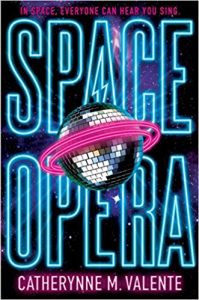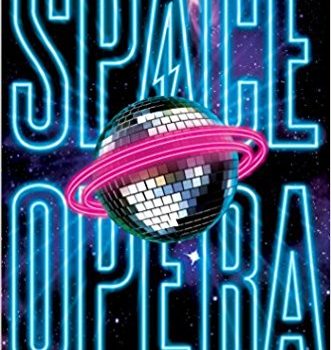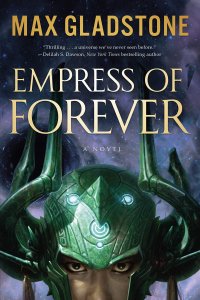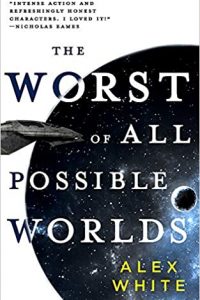Gary K. Wolfe Reviews Space Opera by Catherynne M. Valente
 Space Opera, Catherynne M. Valente (Saga 978-1481497497, $19.99, 304pp, hc) April 2018.
Space Opera, Catherynne M. Valente (Saga 978-1481497497, $19.99, 304pp, hc) April 2018.
Like its acknowledged inspiration, The Hitchhiker’s Guide to the Galaxy, Catherynne M. Valente’s Space Opera is something of a Christmas tree: a fairly generic template adorned with so many glittering ornaments and exuberant sentences careening along like beaded garlands (some of Valente’s more ambitious sentences sound as though they need bongos for backup), that pretty soon the plot itself begins to seem like just another ornament. That is probably just as well, since how many of us remember the actual meandering plot details of Douglas Adams’s epic, at least compared to his overpacked, Where’s-Waldo canvas of alien critters and bizarre civilizations? Valente takes up Adams’s implicit challenge with an even more crowded universe and with an unflagging, nonstop manic humor that hits far more than it misses, offering endless capsule descriptions of worlds ranging from the impossibly sweet Litost (“the kind of world a child would design if that child had never been harmed by the world in even the smallest way and wanted to be a rainbow when it grew up”) to the cemetery-covered world of Fenek, where virtually all life had been infected and turned into rotting zombies by the intelligent virus called the Voorpret. At times her inventions seem to echo the satirical alternate worlds of Ursula K. Le Guin’s Changing Planes as much as the waggish inventions of Adams, but that’s not a bad thing at all.
The term space opera has nothing to do with music, of course, but a number of writers have thought that maybe it should. When Jack Vance wrote his novel Space Opera back in the 1960s, he made an actual opera troupe the center of the story. Valente chooses a washed-up rock group called Decibel Jones and the Absolute Zeros, who find themselves recruited as Earth’s sole representatives to the Metagalactic Grand Prix, a sort universe-wide Eurovision Song Contest with similar origins: just as Eurovision was conceived to help culturally unite Europe after WWII, the Grand Prix was a follow-up to the devastating Sentience Wars, which “engulfed a hundred thousand worlds” a century earlier over the question of what should and should not be counted as sentient species. (Amid the endless barrage of jokes and wisecracks, Valente manages to raise some pretty compelling questions.) Now, the song contest is used to at least partly address this question: only the contestants who end up dead last in the competition face having their entire world annihilated. Needless to say, this places some pressure on the Absolute Zeros, who were chosen – not by fellow humans but by aliens who suddenly appear simultaneously throughout the world – from a list of possible candidates that includes Yoko Ono, Insane Clown Posse, and the Spice Girls. To make matters worse, they seem to have no good ideas at all of what they should sing.
As this might suggest, Valente’s humor, despite its galactic setting, is firmly grounded in Earthbound pop culture. At one point the humans, who are given virtually no chance of avoiding annihilation, are told that “the Carpenters alone pretty much disqualify you” from being recognized at sentient, while the winning song from that zombie-making intelligent virus was “I Can’t Get No Liquefaction” (is it a spoiler to reveal one of the best jokes?). A society of AIs manifests itself in the form of Clippy, that maddening “office assistant” paperclip from old Windows versions, while the flamingo-like alien who appears to Decibel Jones is called Road Runner from the Chuck Jones cartoons, the interstellar ship from the aliens known as Esca is called “Cake in the Rain” from the ancient Jimmy Webb song, and Decibel Jones himself seems pretty strongly influenced by David Bowie, whose glam-rock sensibility underlies much of Valente’s novel. While there is a bit more traditional character development in the backstory of the Absolute Zeros and its members, that’s not really what Space Opera is about, any more than it’s about the machinations surrounding the song contest itself, despite various hints of treachery, backstabbing, and bribery that give the last few chapters a gloss of traditional suspense. What it’s really about is Valente having fun with the sheer possibilities of absurdist invention, of SF as gonzo late-night stand-up improv, and of music’s power to either change the universe or perhaps change nothing at all. Fortunately for us, it’s about as much fun to read as it must have been for Valente to write.
Gary K. Wolfe is Emeritus Professor of Humanities at Roosevelt University and a reviewer for Locus magazine since 1991. His reviews have been collected in Soundings (BSFA Award 2006; Hugo nominee), Bearings (Hugo nominee 2011), and Sightings (2011), and his Evaporating Genres: Essays on Fantastic Literature (Wesleyan) received the Locus Award in 2012. Earlier books include The Known and the Unknown: The Iconography of Science Fiction (Eaton Award, 1981), Harlan Ellison: The Edge of Forever (with Ellen Weil, 2002), and David Lindsay (1982). For the Library of America, he edited American Science Fiction: Nine Classic Novels of the 1950s in 2012, with a similar set for the 1960s forthcoming. He has received the Pilgrim Award from the Science Fiction Research Association, the Distinguished Scholarship Award from the International Association for the Fantastic in the Arts, and a Special World Fantasy Award for criticism. His 24-lecture series How Great Science Fiction Works appeared from The Great Courses in 2016. He has received six Hugo nominations, two for his reviews collections and four for The Coode Street Podcast, which he has co-hosted with Jonathan Strahan for more than 300 episodes. He lives in Chicago.
This review and more like it in the May 2018 issue of Locus.
 While you are here, please take a moment to support Locus with a one-time or recurring donation. We rely on reader donations to keep the magazine and site going, and would like to keep the site paywall free, but WE NEED YOUR FINANCIAL SUPPORT to continue quality coverage of the science fiction and fantasy field.
While you are here, please take a moment to support Locus with a one-time or recurring donation. We rely on reader donations to keep the magazine and site going, and would like to keep the site paywall free, but WE NEED YOUR FINANCIAL SUPPORT to continue quality coverage of the science fiction and fantasy field.








